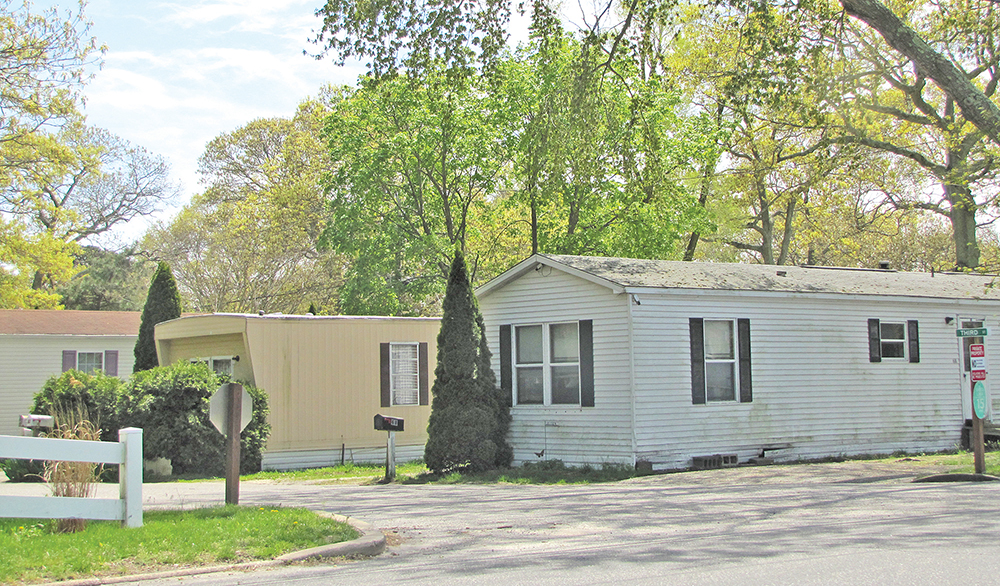Will Senate switch help mobile home bill?


Republicans have controlled the New York State Senate for most of the past 50 years.
But last year, they ceded control of the state Senate to Democrats, who retained the governorship and a majority in the Assembly.
Local mobile-home owners feel they could benefit from this political shift.
For years, a bill to protect mobile-home owners against “unreasonable rent increases” has passed in the Democrat-controlled Assembly, but failed in the Republican-controlled Senate.
“We have a much better chance than in years past because the Senate denied it every year,” said Peter Baldwin of Riverside, vice president of the Mobile/Manufactured Homeowners Association of Suffolk, a group that represents mobile-home owners.
“Now, with the Senate changing over to Democrats, hopefully, we can get this through,” Mr. Baldwin said.
Assemblymen Fred Thiele (I-Sag Harbor) and Anthony Palumbo (R-New Suffolk) are co-sponsors of the Assembly bill. Mr. Thiele said there is also a Senate version of the bill, co-sponsored by senators Rachel May, a Democrat from Syracuse, and Ken LaValle (R-Port Jefferson).
The bill is also part of an overall Assembly housing package that includes renewal of New York City’s rent control laws, which are set to expire June 15.
The housing package contains a number of individual bills that will be voted on separately, but they all have the support of the Assembly leadership, Mr. Thiele said.
Although it’s being packaged with a rent control bill, the mobile home bill is not rent control, he said.
“It’s more like preventing price gouging, except that this is rent gauging. It gives the homeowners a remedy to go to county court to make the park owner justify the rent increase,” he explained.
The state bill would also require the county to adopt it before it takes effect.
Mobile-home owners usually own the units they live in, often called manufactured homes, but lease the sites they sit on from a mobile home park.
In some cases, they rent the homes as well.
Despite their name, most mobile homes cannot be moved, leaving their owners vulnerable to large rent increases or other fees. Local zoning laws often allow mobile homes only in mobile home parks.
The unreasonable rent increase bill states that all rent increases — including all fees, rents, charges, assessments and utilities — shall be subject to judicial challenge by mobile-home owners.
Under the bill, park owners will be required to disclose all fees before entering into a rental agreement with a prospective tenant, under the bill.
The proposal allows any rent increase that exceeds the increase of the Consumer Price Index to be challenged by mobile-home owners, so long as the increase affects 5 percent of the units.
For many Long Island mobile home parks, Mr. Baldwin said, increases always exceed the CPI and/or the cost of living for the year.
“The raises are usually 4% or higher each year. People just can’t afford it,” he said.
Mr. Baldwin cited the case of one elderly woman in the Riverwoods park in Riverside who pays 89.22% of her income for rent each month.
“She’s handicapped, she took care of her father for many years and she never had Social Security,” he said. “So she gets the bare minimum. There are people that help her out because she could not survive if they didn’t.”
Bob Capenos, executive director of the New York Housing Association, which represents the interests of manufactured home builders, retailers and community owners in New York State, said, “We’ve never been in favor of that bill, in the past or in its current version. The biggest reason is that it’s going to result in nothing but court time for residents and community owners. If a high percentage of the homeowners in a community can bring a proceeding to a challenge a rent increase, it’s going to be a perpetual court battle.”
He said the current version of the bill is virtually the same as the bill Mr. Thiele and Mr. LaValle have been trying to get passed for years.
Mr. Capenos said that nationally, many of the mobile home communities currently in operation were constructed after World War II and up until the 1960s, and are now 40 to 60 years old, with aging infrastructure and sewer systems that need to be replaced.
“To impose stringent rent controls on a vital part of affordable housing in the state, and not give the owners of these communities the ability to provide capital improvements for the benefit of the residents — and this would really tie their hands — is a shame.”
Mr. Capenos said they don’t necessarily oppose any legislation, just this particular bill. He feels rent gouging is done by “a microcosm of our members in the state.”
“Yes, we realize there have been some high profile situations that have occurred,” he said, “and we certainly don’t support those.
“If they are in any way in violation of current laws or regulations they are supposed to be operating by, then by all means they should be brought to task.”
Mobile home parks don’t have the high occupancy rates that other forms of rental housing have, he said.
State statistics show that on average, mobile home parks have a 22% vacancy rate, Mr. Capenos said.
Photo caption: Mobile-home owners are hoping a change in the state Senate will enable a law governing ‘unreasonable rent increases’ in mobile home parks to pass. Pictured: Riverhaven Park in Riverhead. (Credit: Tim Gannon)








